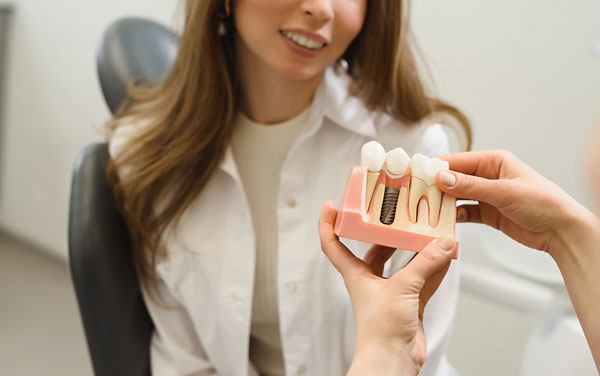Dental Implant Supplemental Procedures
What Are Supplemental Procedures?
Supplemental procedures refer to additional steps that may be necessary to prepare the mouth for the placement of dental implants. These procedures are designed to address specific issues that can affect the success of the implant placement, such as insufficient jawbone density, issues with the gums, or other factors that may impact the stability and longevity of the implant. Some common examples of supplemental procedures include bone grafting, sinus lifts, and ridge augmentation.
Supplemental procedures aren’t always necessary, and the need for them will be determined on a case-by-case basis by your oral surgeon or periodontist. The risks, benefits, and healing times of each procedure must be discussed before implant placement.
In some cases, dental implants may not be the best tooth replacement. To find out more, schedule your consultation with our Grand Haven dentist by calling (616) 842-2850.

Bone Grafting
A Bone grafting procedure is used when there’s not enough healthy jawbone present to support the implant post. During bone graft surgery, a small amount of bone is removed from another part of the body, such as the hip or the tibia, and placed in the jawbone to restore its strength.
After a bone graft, patients will need to carefully follow their dentist’s post-operative instructions to ensure a successful recovery. Instructions may include avoiding hard or crunchy foods, taking any prescribed medications, and maintaining good oral hygiene at home.
While you recover, the bone graft will integrate with the existing bone, creating a strong foundation for dental implants or other tooth replacement options.
Sinus Lift
Sinus lifts are typically necessary when the upper jaw has too little bone height or the sinuses are too close to the jaw for traditional implant placement. The sinus membrane is lifted during this procedure, and bone is added to the upper jaw to provide support for the implant.
The sinus is an air-filled cavity located behind the cheekbones and above the upper back teeth. When these teeth are lost or extracted, the sinus expands and causes the bone to become thinner, making it difficult to place dental implants.
After a sinus lift, patients may experience bruising, swelling, and minor discomfort. However, these symptoms are easily manageable with medications and plenty of rest. Make sure to follow your dentist’s instructions for post-op care.
Ridge Augmentation
Ridge augmentation is used to improve the chances of successful implant placement. When the jawbone has been resorbed, or worn away, leaving a narrow or uneven ridge in the jaw, ridge augmentation may be necessary. During ridge augmentation, bone is added to the jaw to build up the ridge and create a stable foundation for the implant.
Recovery time for ridge augmentations varies depending on the extent of the procedure. Patients may experience swelling or minor discomfort after the procedure, but symptoms can be easily managed with rest and medications.
Frequently Asked Questions
How long does it take to heal from a supplemental procedure?
Healing time can vary depending on the specific procedure, but bone grafting and sinus lifts can take several months to heal before a dental implant treatment can begin.
Are supplemental procedures always necessary?
No, supplemental procedures aren’t always necessary. Whether a supplemental procedure is needed before a dental implant treatment depends on the individual’s oral health. Some medical conditions may not require a supplemental procedure, while others may require one to achieve the desired implant results.
Will insurance cover the cost of supplemental procedures?
Whether insurance will cover the cost of a supplemental procedure depends on your insurance plan. Some insurance plans may cover the costs, while others may only partially cover it or not cover it at all. It’s best to check with your insurance provider for specific information about coverage for a particular supplemental procedure. It’s also a good idea to carefully review your insurance policy and understand any deductibles, copays, and other costs you may be responsible for.
Get Dental Implant Ready With Supplemental Procedures
Dental implant supplemental procedures are additional steps that may be necessary to prepare the mouth for the placement of dental implants. Learn more about supplemental procedures or dental implants with our Grand Haven dentist. Contact our dental office today at (616) 842-2850 to schedule your appointment.
Related Topics
- All-On-4 Dental Implants
- Benefits of Dental Implants
- Cost of Dental Implants
- Dental Implant Candidacy
- Dental Implant Maintenance
- Dental Implant Procedure
- Dental Implants vs. Other Tooth Replacements
- Endosteal Dental Implants
- Implant-Supported Bridges
- Implant-Supported Dentures
- Mini Dental Implants
- Risks & Complications of Dental Implants
- Same-Day Dental Implants
- Single-Tooth Dental Implants
- Smoking and Dental Implants
- Subperiosteal Dental Implants
- Supplemental Procedures
- Zygomatic Dental Implants

